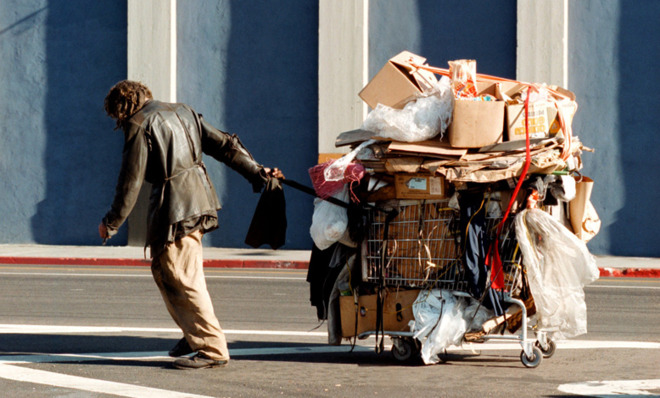No, wrecking shopping carts won't help the homeless
It's not a problem that can be solved with a sledgehammer...

A free daily email with the biggest news stories of the day – and the best features from TheWeek.com
You are now subscribed
Your newsletter sign-up was successful
Hawaii state Representative Tom Brower (D) has been taking a sledgehammer to Hawaii's homelessness problem. Literally. Wielding a sledgehammer, the lawmaker has destroyed over 30 shopping carts used by homeless people to store and transport their belongings.
Brower claims his actions are a product of his frustration over the existence of homelessness in his district, telling Hawaii News Now, "I got tired of telling people I'm trying to pass laws. I want to do something practical that will really clean up the streets."
Brower also wakes those he finds sleeping and tell them to sleep somewhere else. "If someone is sleeping at night on the bus stop, I don't do anything, but if they are sleeping during the day, I'll walk up and say, 'Get your ass moving,'" he said.
The Week
Escape your echo chamber. Get the facts behind the news, plus analysis from multiple perspectives.

Sign up for The Week's Free Newsletters
From our morning news briefing to a weekly Good News Newsletter, get the best of The Week delivered directly to your inbox.
From our morning news briefing to a weekly Good News Newsletter, get the best of The Week delivered directly to your inbox.
Hawaii has one of the highest rates of homelessness in the country, second only to the District of Columbia and rising seven percent from 2009 to 2009 — a notable contrast to the one percent decline America's overall homeless population has experienced during the same time period.
So what's to blame for Hawaii's particular problem? It's not that common urban myth "out of towners" — only 3.3 percent of the homeless have lived in Hawaii for one year or less. It's also not laziness, and it's certainly not an overabundance of shopping carts.
What seems more likely as a culprit, however, is Hawaii's long-standing housing issues. According to Victor Geminiani of the Hawaii Independent:
Hawaii's median rent is 50 percent greater than the national median, and 75 percent of households living in poverty spend more than half of their income on rent. Additionally, Hawaii has the highest cost of living in the United States, but one of the lowest average-adjusted incomes. [The Hawaii Independent]
There are, of course, other complex socioeconomic phenomena that cause people to become homeless: Unemployment, debt, home repossessions, drugs and alcoholism, physical disability, mental illness, domestic violence and social alienation — none of which can be addressed by smashing up shopping carts.
A free daily email with the biggest news stories of the day – and the best features from TheWeek.com
But there are remedies. Building affordable and sheltered housing can help, as can drug and mental health treatment programs, job training programs, and offering aid and advice to people whose home is in danger of being repossessed.
Luckily, Tom Brower is not the only politician in Hawaii. Governor Neil Abercrombie has said that tackling homelessness is a top priority for his administration, and Hawaii's state legislature passed a bill in July to tackle homelessness. It approved some helpful things — including substance abuse and mental health treatment and a rental assistance program — as well as some unhelpful ones, like spending $100,000 buying plane tickets for homeless people to get them to leave the islands.
Meanwhile, in the face of a global media storm, Tom Brower is hanging up his sledgehammer. He told the Honolulu Star-Advertiser: "The point that I was trying to make has been made."
Hopefully, his tactics won't be copied elsewhere.
John Aziz is the economics and business correspondent at TheWeek.com. He is also an associate editor at Pieria.co.uk. Previously his work has appeared on Business Insider, Zero Hedge, and Noahpinion.
-
 How the FCC’s ‘equal time’ rule works
How the FCC’s ‘equal time’ rule worksIn the Spotlight The law is at the heart of the Colbert-CBS conflict
-
 What is the endgame in the DHS shutdown?
What is the endgame in the DHS shutdown?Today’s Big Question Democrats want to rein in ICE’s immigration crackdown
-
 ‘Poor time management isn’t just an inconvenience’
‘Poor time management isn’t just an inconvenience’Instant Opinion Opinion, comment and editorials of the day